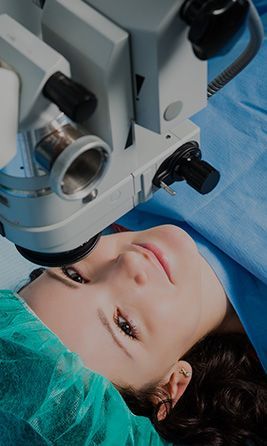Photorefractive Keratectomy Surgery in West Springfield, MA

Photorefractive keratectomy surgery is a type of laser vision correction procedure. PRK surgery helps correct refractive errors in your vision, focusing light properly so you can see clearly. To do this, we use a laser to make precise changes to the shape of your cornea, similar to the way an expert jeweler knows how to make a diamond shine.
Laser Vision Correction
The purpose of PRK surgery is to help correct nearsightedness, farsightedness, and astigmatism. That way, you can have clear vision without relying on contact lenses or glasses. About 90% of people who have PRK surgery have 20/20 vision a year after surgery, and over 95% have 20/40 vision or better.
As with other types of laser vision correction, for the best results, your lens prescription should have remained the same for about a year before surgery. Having good eye health is important so tissues can heal quickly following surgery.
We care deeply about our patients, so our team performs a careful evaluation prior to scheduling PRK surgery. This gives us the opportunity to check your eye health and answer all of your questions.
PRK Surgery vs. LASIK
A common question our patients ask is whether PRK surgery or LASIK is the right choice. In reality, both types of laser vision correction are effective, and both are good choices for many patients.
In LASIK, a tiny flap is created in the outer layer of the cornea (and slid back into place after surgery) to allow the treatment laser to correctly reshape the cornea. PRK surgery simply removes this outer layer, which naturally grows back afterward.
That makes PRK surgery a better fit for certain candidates:
- People who have dry eyes: PRK surgery can be more comfortable for people with dry eyes.
- Some athletes: Eye impacts can loosen the flap from LASIK surgery, so baseball players, volleyball players, swimmers, wrestlers, and other athletes may choose PRK surgery instead.
- Workers with a higher risk of eye injuries: If your job puts your eyes at risk of severe irritation, inflammation, or injuries, such as welding, PRK surgery may be more appropriate.
- People with thin corneal tissue: If your corneas are naturally thin, PRK surgery is generally recommended over LASIK.
FAQs for PRK Surgery
How Does PRK Surgery Work?
PRK or Photo-Refractive Keratectomy treats refractive errors by removing tissue from the surface of the cornea. By altering the shape or placement of the laser beam, the cornea is made flatter to treat nearsightedness, steeper to treat farsightedness, and/or more spherical to treat astigmatism.
What Can You Expect During PRK Surgery?
First, your eye is completely numbed using “eye drop” anesthesia, and an instrument is placed between the eyelids to prevent blinking. Then, the surgeon removes the epithelium, a thin layer of protective skin that covers the cornea. The patient is told to look directly at the target light during the procedure. In less than a minute, the laser removes the proper amount of tissue while it reshapes the surface of the cornea.
What are the Side Effects of PRK Surgery?
Patients may experience blurry or hazy vision for one to five days and variable discomfort until the epithelium heals and covers the treated area. Eye drops, pain medication, and a protective contact lens are effective in minimizing this postoperative discomfort. Final visual results may be fully realized anywhere from several days to a month or more as the surface heals in accordance with each individual’s healing tendencies.
Experts in PRK Surgery and LASIK
At Northeast Laser, we provide PRK surgery, LASIK laser vision correction, surgery for cataracts, and many other options for clear vision. If you’re not sure whether to choose PRK surgery vs. LASIK, don’t worry. It’s not a decision you have to make on your own. During your initial evaluation, our friendly eye doctors explain all of the options for vision correction available. We show you the pros and cons and offer recommendations you can trust.
To learn more about PRK surgery in Springfield, MA, call a representative at 413.363.2732. If you prefer, you can also contact us online.
Click Here to Get In Touch With Us
Hours:
Mon
8:30 - 5:00
Tues
8:30 - 5:00
Wed
8:30 - 5:00
Thurs
8:30 - 5:00
Fri
8:30 - 5:00
Sat/Sun
Closed
Book An Appointment
When you’re ready to take the next step towards safe and permanent vision correction, call our office at 413.363.2732 or fill out our contact form and we’ll schedule a free consultation for No Blade LASIK in West Springfield, MA.